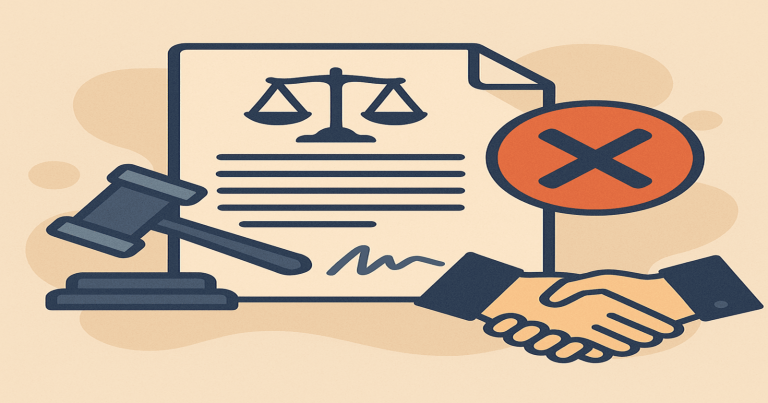Every contract has a life cycle—from the time of agreement to when all work is done. When a contract ends legally, we call it a discharge of contract. This means the parties involved no longer need to perform any duties under that contract. The contract becomes finished, closed, and has no more value in the eyes of the law. The discharge of a contract can happen in many ways—when both parties do what they promised, agree to cancel it, or even when one party breaks the rules. In simple terms, discharge means freedom from all promises made in the contract. After the discharge, neither party can file a case to enforce the agreement because it no longer exists.
What is the Discharge of the Contract
The term discharge of a contract means that the contract has ended. Both parties have either completed their part, or a legal reason has agreed. After discharge, no duties remain, and the contract closes.
When a contract ends legally and properly, it protects both parties. Nobody can ask for more action or payment. It gives peace of mind to both sides and avoids future disputes. It also keeps the contract system clean and fair.
This concept is fundamental in business law. Every student or businessperson should know how and when a contract ends. It helps manage agreements and avoid mistakes.

Types of Discharge of Contract
Contracts do not always end in the same way. Law provides different methods for ending a contract, each with its rules and situations. Below are the five main types of contract discharge with full explanations.
1. Discharge by Performance
This is the most common way to end a contract. When both parties finish their duties as promised, the contract ends. This is called actual performance.
For example, the contract ends if a shopkeeper agrees to deliver 100 chairs and the buyer pays for them. Both parties have done what they decided. There is no need for further action or payment.
Sometimes, one party offers to perform, but the other refuses. This is known as attempted performance. In such cases, the offering party is legally free from the contract.
2. Discharge by Mutual Agreement
Sometimes, both parties may agree to cancel, change, or replace the old contract. This is called discharge by mutual consent. It is legal and allows changes if both sides accept.
For instance, if one party was supposed to deliver computers, but both parties agreed to cancel the deal, the contract ended peacefully. No one can ask for a performance after that.
There are 4 ways to discharge by agreement:
- Novation – The old contract ends, and a new one starts.
- Alteration – The terms of the same contract have changed.
- Rescission – Parties cancel the contract entirely.
- Remission – One party lets go part or full of the promise.
3. Discharge by Impossibility of Performance
Sometimes, doing contract work becomes impossible due to things no one can control. In that case, the law ends the contract. This is known as frustration.
For example, if a singer agrees to perform at a show but falls seriously ill, he cannot fulfil the promise. The court will discharge the contract because the work is impossible now.
Reasons for impossibility include natural disasters, changes in law, death of an important person, or destruction of subject matter. The law protects both parties in such cases.
4. Discharge by Breach of Contract
If one party does not follow the contract or refuses to perform, the other party can end the contract. This is called discharge by the breach.
Suppose a supplier was supposed to deliver rice but failed to do so. The buyer can cancel the contract and claim damages. The breaking party is at fault here.
There are two types: actual breach (when one fails on the agreed date) and anticipatory breach (when one party tells in advance they won’t perform). Both cases allow the other party to exit the contract legally.
5. Discharge by Operation of Law
In exceptional cases, the law itself can cancel a contract. This is called discharge by operation of law. It applies without any action from either party.
For example, if a person dies and the contract needs his service, the contract ends automatically. The law discharges it because the work cannot continue without him.
Other reasons include bankruptcy, loss of legal status (like company closure), or a minor entering into a contract. The law ensures fairness when continuing the contract is not possible.
Advantages of Discharge of Contract
Ending a contract the right way gives many benefits to both parties. It protects their rights and avoids future problems. Below are some key advantages.
1. Freedom from Further Duties
Once the contract ends, no one needs to perform more work or make more payments. This gives peace of mind to both parties and helps them plan. The law confirms that they are free from legal responsibility.
2. Prevents Legal Disputes
If the contract ends clearly and adequately, there is less chance of a court case. This helps save time, money, and energy. It also keeps business relationships strong and respectful.
3. Helps Start New Contracts
After a contract ends, both parties are free to make new contracts. They can take on new work, enter new deals, or freshly planned business. This gives new opportunities without legal pressure from the old contract.
4. Fairness to Both Sides
Discharge rules are fair. They protect both parties, especially when problems arise without anyone’s fault. This builds trust in legal systems and encourages honest agreements.
Disadvantages of Discharge of Contract
While discharge is valid, it can also lead to some issues. These problems mainly arise when one party is dishonest, or the discharge happens suddenly.
1. One Party May Suffer Loss
If a contract ends early, the party that spent time or money may suffer a loss. For example, if a buyer cancels the deal late, the seller may lose goods or time. This can affect trust in future deals.
2. Hard to Prove frustration
Sometimes, it is hard to prove that the work has become impossible. The court checks all facts before accepting the reason. If one party gives a false sense, the case may take longer and cause stress.
3. Misuse of Legal Gaps
Some parties may misuse the discharge rules. They may claim impossibility or agreement to avoid their duties. This can harm the honest party and damage their business.
FAQs on Discharge of Contract
Q1. What does discharge of contract mean?
This means the contract has ended, and both parties are free from all duties.
Q2. What are the main types of discharge?
Performance, mutual agreement, breach, impossibility, and operation of law.
Q3. Can a contract end without performance?
Yes, it can end by agreement, breach, impossibility, or law.
Q4. What is frustration in contract law?
It means the work cannot be done because of illness, disaster, or legal change.
Q5. Why is this topic important for students?
It helps in exams, business understanding, and real-life legal safety.


